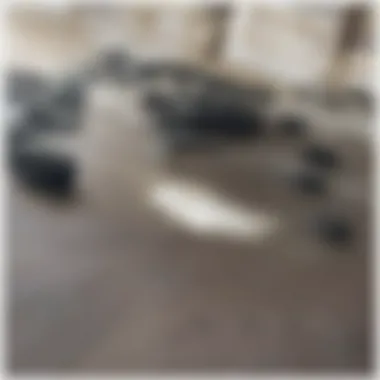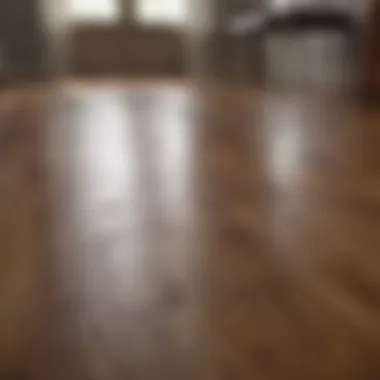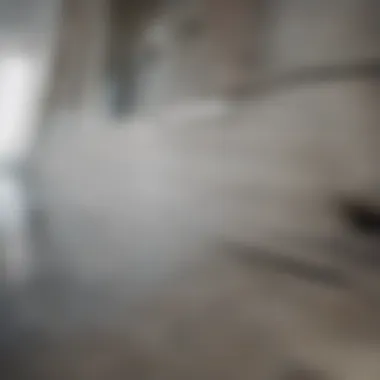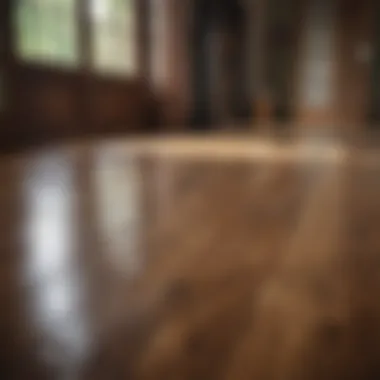Can You Safely Clean Hardwood Floors with Vinegar?


Intro
Hardwood floors are a staple in many homes due to their aesthetic appeal and durability. However, maintaining these floors can pose a challenge. Homeowners often seek effective cleaning solutions that do not compromise the wood’s integrity. One popular option is white vinegar. This acidic liquid is seen by many as a natural and inexpensive cleaning agent.
In this discussion, we aim to examine whether white vinegar is suitable for cleaning hardwood floors. We will delve into the benefits and potential drawbacks. Additionally, we will provide practical advice on cleaning techniques and alternate cleaning methods. This approach not only highlights the relevance of maintaining hardwood surfaces but also informs readers about best practices and safety considerations.
Investigating White Vinegar's Effectiveness
White vinegar is known for its cleaning properties. Its acidity helps break down dirt, grime, and stains. Many people suggest mixing it with water for optimal results.
Benefits of Using White Vinegar
- Cost-Effective: White vinegar is relatively inexpensive compared to commercial cleaners.
- Natural Ingredient: It is a non-toxic alternative, making it safer for households with pets and children.
- Deodorizing Properties: Vinegar can neutralize odors, leaving the floor smelling fresh.
Potential Drawbacks
- Acidity Concern: The acidity in vinegar can weaken wood finishes over time.
- Sensitivity: Certain hardwood varieties may react negatively to vinegar, leading to discoloration or damage.
Cleaning Techniques
Utilizing white vinegar involves a few essential steps to ensure effectiveness and safety:
- Preparation: Sweep or vacuum the floor to eliminate loose dirt.
- Mixing Solution: Create a cleaning solution with equal parts of white vinegar and warm water.
- Test Area: Always test the solution on a small, inconspicuous area of the floor before broader application.
- Application: Dampen a soft cloth or mop with the solution. Avoid soaking the wood, as excess moisture can cause damage.
- Drying: After cleaning, ensure the floor dries thoroughly to prevent water absorption.
"Using white vinegar on hardwood floors can be effective, but caution is crucial to prevent potential damage to the wood's finish."
Alternative Cleaning Methods
While white vinegar can serve as a cleaning solution, alternatives exist that may offer superior results without the risks:
- Commercial Wood Cleaners: Products specifically designed for hardwood floors can provide a safer cleaning experience.
- Soap and Water: A mild dish soap diluted in water can also be effective for regular cleaning.
- Microfiber Mops: These are designed to trap dirt and are less likely to damage wood surfaces compared to traditional mops.
Culmination
In summary, white vinegar can be an effective cleaner for hardwood floors if used correctly. Understanding both its benefits and limitations allows homeowners to make informed choices. However, considering alternative methods might provide safer options for preserving the quality and appearance of hardwood floors over time. By balancing natural cleaning methods and commercially available solutions, it is possible to maintain the beauty and integrity of hardwood flooring.
Understanding Hardwood Floors
Understanding hardwood floors is essential for homeowners who want to maintain their elegance and durability. This section explores the fundamental aspects of these floors, offering insights into their structure, finishes, and the challenges associated with maintaining them. Knowledge of these elements is crucial when considering cleaning methods, such as using white vinegar, to ensure their long-term health and aesthetic appeal.
Composition of Hardwood Floors
Hardwood floors are primarily made from natural wood and come from various tree species. Common examples include oak, maple, and cherry. The composition affects not only the floor's appearance but also its durability and adjustability to different environments. Each wood type has unique characteristics, such as hardness, grain pattern, and color. Understanding these traits helps homeowners choose the right hardwood for their needs but also dictates how they should be cleaned and maintained. For instance, a softer wood like pine could be more susceptible to scratching compared to a denser species like hickory.
Types of Hardwood Finishes
The finish applied to hardwood flooring is a significant factor that influences its maintenance and cleaning regimen. There are several types of finishes, each with different properties:
- Oil-based Polyurethane: This finish provides a durable layer that protects the wood. It offers a warm, amber hue but takes longer to dry.
- Water-based Polyurethane: This option dries faster and has minimal odor. It keeps the wood's natural color but may not be as durable as oil-based finishes.
- Natural Oil Finish: This treatment penetrates the wood, providing some protection while maintaining the original look. However, it may require more frequent reapplication compared to synthetic finishes.
- Wax Finish: Traditional yet less common nowadays, wax finishes give an attractive sheen but are less resistant to stains and wear. They require special cleaning solutions not to damage the finish.
Selecting the appropriate finish is essential as it determines not only the look of the floor but also the cleaning methods that can be employed without causing harm.
Common Maintenance Challenges
Maintaining hardwood floors presents specific challenges that can differ from other flooring types. Homeowners often face issues such as:


- Scratches and Scuff Marks: Pets, furniture, and high-heeled shoes can cause damage, and addressing these scratches is critical to preserving the floor's appearance.
- Water Damage: Excess moisture can warp wood, making it vital to promptly address spills and avoid excessive water during cleaning.
- Dirt and Dust Accumulation: Hardwood floors can trap particulates, leading to a dull appearance over time.
- Fading and Discoloration: Prolonged exposure to sunlight can change the color of the wood, necessitating protective measures.
Recognizing these challenges allows homeowners to adopt better strategies for maintenance, including the choice of cleaning solutions like white vinegar. This knowledge is vital in achieving a balance between cleanliness and preserving the integrity of the floor.
Intro to White Vinegar
Understanding white vinegar's role in cleaning is crucial for any homeowner considering maintaining hardwood floors. This section will delve into the chemical properties of white vinegar, its historical uses, and the distinctions between culinary and household vinegar. Each of these aspects informs how effectively and safely vinegar can be utilized in your cleaning routine.
Chemical Properties of White Vinegar
White vinegar primarily consists of acetic acid, typically around 5-7% concentration in household formulations. This acidity contributes to its cleaning prowess. Acetic acid is known to dissolve mineral deposits, grease, and grime, making it a common choice for various cleaning tasks. When diluted with water, white vinegar can produce a solution that is effective for disinfecting surfaces. Although this property can make it useful for many household cleaning jobs, it must be noted that its acidity may also pose risks for certain finishes on hardwood floors.
Historical Uses of Vinegar
Historically, vinegar has been wielded as a cleaning agent for centuries across different cultures. From ancient Romans who used it for various domestic purposes to more modern applications in kitchens and bathrooms, vinegar's reputation as a versatile cleaner endures. It has been utilized for deodorizing and disinfecting, showcasing its broad spectrum of usefulness. Its efficacy in combating bacteria and odors is well-documented, making it a staple in many homes. Understanding these historical uses can shed light on its current application in cleaning hardwood floors.
Culinary vs. Household Vinegar
Not all vinegar is made equal. Culinary vinegar, such as balsamic or apple cider vinegar, is primarily used for flavoring foods and dressings. In contrast, household white vinegar is optimized for cleaning and other practical applications. The distinction lies in purity, acidity levels, and intended usage. Using culinary vinegar for cleaning may not be effective, or it may leave undesirable residues that are not found in white vinegar. For hardwood floor maintenance, recognizing the difference between these types is essential for effective and safe cleaning.
Is White Vinegar Safe for Hardwood Floors?
Understanding whether white vinegar is safe for hardwood floors is crucial for homeowners and renters alike. Hardwood floors are often a significant investment within a property, and maintaining them involves careful consideration about cleaning methods. Using the wrong cleaning product can lead to damage, so grasping the implications of using vinegar is important. This section delves into scientific perspectives, the benefits of vinegar, and the associated risks.
Scientific Opinions on Vinegar Usage
Vinegar, particularly white vinegar, is commonly recognized for its cleaning properties. The acetic acid within vinegar provides effective antibacterial qualities. According to some scientific research, various cleaning agents that include vinegar can significantly reduce bacteria on surfaces.
However, experts have mixed opinions about its use on hardwood floors. Some professionals suggest that while vinegar is effective at removing grime and moderate stains, it must be diluted to prevent any adverse reactions. A mixture that is too concentrated can alter the floor’s finish and lead to wear over time. It is therefore essential to consider these viewpoints when deciding on your cleaning regimen.
Assessing the Risk of Damage
While the allure of an all-natural cleaning solution like white vinegar is strong, there are inherent risks that should be considered. The primary concern revolves around the acidity level in vinegar. When used improperly, the acid can wear down the protective finish on hardwood floors. This diminishes the sheen and can ultimately lead to more extensive damage, necessitating costly repairs or refinishing.
Homeowners should assess the type of finish on their hardwood floors before employing a vinegar solution. For example, floors treated with oil-based finishes may react differently than those sealed with polyurethane. Testing any cleaning solution in an inconspicuous area before general application can be beneficial. Consider these points to mitigate the risk of damaging your hardwood surfaces:
- Test First: Apply a diluted vinegar solution on a small, hidden area. Observe if there’s any alteration or undesired effect.
- Frequency of Use: Limit vinegar cleaning to occasionally and rotate with gentler methods to preserve the floor’s integrity.
- Proper Dilution: Always dilute vinegar properly before use. A common ratio is one cup of vinegar to a gallon of water.
"Using vinegar on hardwood floors can be advantageous, but should be performed mindfully to avoid unintended damage."
In the realm of floor care, knowledge is power. Understanding the scientific backing and associated risks with the use of white vinegar lays the groundwork for safe and effective cleaning practices. By being informed, homeowners can make more educated choices that maintain the beauty and longevity of their hardwood floors.
Benefits of Using White Vinegar
Understanding the benefits of using white vinegar as a cleaning agent is crucial when considering its application on hardwood floors. The efficacy of white vinegar in common cleaning situations can be very favorable. Primarily, it is affordable and accessible, making it an attractive choice for many homeowners. This section will delve into specific elements that underpin the benefits of using white vinegar, focusing on its natural disinfectant properties and cost-effectiveness.
Natural Disinfectant Properties
One of the premier benefits of white vinegar is its natural disinfectant properties. Vinegar contains acetic acid, which has been shown to kill some types of bacteria and viruses. This is particularly beneficial for maintaining sanitary conditions in homes, which is essential for health. Regular cleaning with white vinegar may help minimize pathogens on the floor's surface, contributing to a cleaner environment overall. However, it's important to note that while white vinegar can effectively reduce certain germs, it is not a replacement for more potent disinfectants that are recommended for critical microbial control environments.
- Consider the following points about disinfectant properties of white vinegar:*
- White vinegar can neutralize odors, enhancing the air quality in your space.
- It can effectively clean surfaces without the addition of harsh chemicals, which is especially helpful for households with pets or small children.
- When used in moderation, it poses minimal risk to the finish of your hardwood floors compared to many commercial cleaners.
Cost-Effective Cleaning Solution
In terms of cost, white vinegar stands out as a remarkably affordable cleaning solution. Most households already have some form of vinegar in their kitchens. When compared to specialized hardwood cleaning products, white vinegar offers a significant savings advantage. This can be especially beneficial for individuals maintaining larger areas of hardwood, where cleaning expenses can accumulate quickly.


The following aspects illustrate why white vinegar is a cost-effective choice for hardwood floor cleaning:
- Wide Availability: White vinegar is commonly found in grocery stores and can be purchased in bulk, often reducing the per-use cost even further.
- Multipurpose Use: Beyond cleaning hardwood floors, it can serve multiple household functions, such as deodorizing and removing stains in kitchens and bathrooms, making it a versatile addition to cleaning supplies.
- Simple Preparation: Homeowners can easily mix it with water to create a simple cleaning solution, avoiding complex formulations often found in commercial products.
Ultimately, the combination of its disinfecting ability and cost-efficiency makes white vinegar a viable option for those looking to clean hardwood floors effectively without undue financial burden.
"Vinegar offers a sustainable, cost-effective method for maintaining hardwood floors, transforming it into an essential cleaning ally for many homeowners."
By recognizing these benefits, readers can make informed decisions about how best to approach cleaning their hardwood floors while considering both efficacy and budget constraints.
How to Clean Hardwood Floors with White Vinegar
Cleaning hardwood floors effectively is important for their longevity and appearance. White vinegar, a common household item, offers a feasible solution for maintaining these floors. In this section, we will outline why understanding the cleaning process with white vinegar matters. It is vital to know the right technique, as incorrect usage can lead to damage rather than cleanliness. Therefore, one needs to balance the vinegar's potential benefits against its acidity and the specific floor finish involved.
Preparation Before Cleaning
Before embarking on the cleaning journey, preparation is essential. Start by sweeping or vacuuming the floor thoroughly to eliminate debris. Any grime or dirt left may scratch the surface during the cleaning process.
Items needed for preparation:
- Broom or vacuum
- Microfiber mop or cleaning cloth
- Bucket
- Measuring cup
- White vinegar
Ensure your cleaning area is well-ventilated. Open windows or turn on fans if necessary. Eliminate any moisture near the floor as excess water can damage the integrity of hardwood. Also, inspect your floor for any loose boards or areas needing repair to ensure safety during cleaning.
Recommended Cleaning Solution Ratio
When diluting white vinegar for cleaning, the correct ratio is paramount. An effective mixture entails one part white vinegar to three parts warm water. This dilution reduces acidity levels while still utilizing vinegar’s natural disinfectant properties.
Example:
If you use one cup of white vinegar, mix it with three cups of warm water. This ratio ensures the solution is potent enough to cut through grime without harming the floor’s finish.
Step-by-Step Cleaning Process
Follow these steps for a thorough clean:
- Prepare the Cleaning Solution: Mix the vinegar and water in a bucket, ensuring proper ratio as highlighted earlier.
- Soak the Mop: Dip a microfiber mop or cloth in the solution and wring it out. Excess water can lead to long-term effects on hardwood.
- Clean the Floor: Start mopping from one corner and move toward the exit. This technique prevents stepping on freshly cleaned sections.
- Rinse the Mop Frequently: Dip the mop back into the solution as needed, but remember to wring it out well before applying it back on the floor.
- Dry the Floor: After mopping, allow the floor to air dry. If desired, use a dry, clean microfiber cloth for quicker drying and shine:
"Regular cleaning prevents buildup and helps maintain the shine of hardwood floors."
This method ensures the cleaning process is efficient and safe for your hardwood floors, preserving their naturally beautiful appearance.
Alternatives to White Vinegar
Exploring alternatives to white vinegar when cleaning hardwood floors is essential for maintaining their beauty and longevity. While vinegar can be effective but also has its drawbacks, understanding other cleaning options allows homeowners to make informed decisions based on their needs. The discussion on alternatives navigates both commercial cleaners and homemade solutions, highlighting their benefits and potential risks.
Commercial Hardwood Floor Cleaners
Commercial hardwood floor cleaners present a convenient option for maintaining these surfaces. Many of these products are specifically formulated to clean without damaging the finish. When choosing a cleaner, it’s crucial to look for pH-balanced solutions, as acidic or alkaline cleaners can harm the wood over time.
Benefits of commercial cleaners include:
- Expert Formulation: Many brands like Bona and Murphy's Oil Soap develop solutions based on research, ensuring effectiveness and safety.
- Ease of Use: These products often come with straightforward instructions, allowing for consistent cleaning results.
- Variety of Choices: Options exist for specific wood finishes, addressing the unique needs of different hardwood types.
While commercial cleaners are generally deemed safe, one should always test a small area first. This way, any adverse reaction with the specific finish can be identified before applying the product to the entire floor.
Homemade Cleaning Solutions
Homemade cleaning solutions provide a cost-effective and eco-friendly alternative to commercial cleaners. They can be made with common household ingredients, reducing reliance on potentially harmful chemicals. A popular mix includes water, mild soap, and a small amount of oil, offering a gentle but effective means to clean hardwood floors.


Key benefits of homemade solutions include:
- Customization: Homeowners can adjust recipes to suit their preferences and floor type. Ingredients can be selected based on their availability.
- Less Chemical Exposure: Making cleaners at home reduces exposure to synthetic chemicals, which can sometimes cause allergies or respiratory issues.
- Cost Efficiency: Often, the ingredients needed are already at home, reducing the need for additional purchases.
When formulating a homemade cleaner, it’s essential to avoid excess water and any ingredients that could leave residue. Rinsing well after application ensures that the floor maintains its luster and prevents buildup.
"While white vinegar is a popular method, evaluating commercial and homemade cleaners broadens your approach to hardwood floor maintenance, often leading to better results."
Long-Term Effects of Vinegar Cleaning
Understanding the long-term effects of cleaning hardwood floors with white vinegar is crucial for homeowners and maintenance professionals. This section delves into the implications of routine vinegar use on floor finishes and the potential for residue accumulation. By comprehending these effects, one can make informed decisions that ensure the longevity and aesthetics of hardwood flooring.
Impact on Floor Finish Longevity
Regular cleaning with vinegar poses a risk to the longevity of hardwood floor finishes. While vinegar is celebrated for its natural cleaning properties, its acidity can gradually wear down protective layers of coatings such as polyurethane or varnish. This degradation may lead to surface dullness and vulnerability to scratches and stains.
Some key considerations include:
- Acidic Nature of Vinegar: The pH level of white vinegar is around 2.4, which can be harsh on finished hardwood floors if used excessively.
- Frequency of Use: Using vinegar frequently could mean more wear and tear on the finish compared to other cleaning agents designed for hardwood.
- Manufacturer Guidelines: Many flooring manufacturers advise against using vinegar due to its potential to void warranties related to finishes.
It is essential for homeowners to consider the type of finish on their hardwood floors and the manufacturer's recommendations before adopting vinegar as a regular cleaning agent.
Potential for Residue Buildup
In addition to its impact on flooring finish, vinegar can also lead to residue buildup. While it is effective in cutting through grime and dirt, if not rinsed properly, vinegar can leave behind a film that can attract dirt and dust.
Factors contributing to residue buildup include:
- Improper Dilution: Using vinegar at higher concentrations without diluting it adequately can increase the likelihood of residue. The proper dilution ratio, as discussed earlier, is crucial for minimizing this risk.
- Environmental Factors: In humid or high-traffic areas, the chance of residue trapping moisture and dirt increases, leading to a less appealing appearance over time.
- Cleaning Technique: Applying vinegar directly to the floor without the use of a damp cloth or mop may further contribute to residue issues.
Expert Recommendations
Understanding how to care for hardwood floors is crucial for maintaining their beauty and extending their lifespan. In this section, we will discuss expert recommendations based on professional insights and best practices in the industry. These recommendations are vital for anyone looking to ensure that their hardwood floors not only look good but also remain durable over time.
Advice from Floor Care Professionals
Many flooring experts emphasize the significance of choosing the right cleaning method. While many household cleaners are effective on various surfaces, hardwood floors require special attention.
Professionals often recommend using minimal moisture during cleaning. Excess water can seep into the seams and damage the wood, leading to warping. Instead of soaking a mop, experts suggest using a damp mop with a cleaning solution prepared using white vinegar. This allows for effective cleaning while minimizing the risk of damage.
"It's essential to remember that hardwood is a natural material. Care should be taken not to use any harsh chemicals that can strip away its finish."
Additionally, using distilled white vinegar is a well-accepted recommendation. Its acetic acid content makes it effective at cutting through grease and dirt without leaving harmful residues.
Industry Best Practices for Maintenance
When it comes to maintaining hardwood floors and cleaning them effectively, following industry best practices is crucial. These practices are based on the collective insights of flooring specialists and industry standards.
- Regular Dusting and Sweeping: Regularly sweep or dust hardwood floors to remove dirt and debris. This prevents scratching.
- Spot Cleaning Stains: For spills, it is advisable to clean promptly with a soft cloth, using a small amount of white vinegar solution if needed.
- Application of Protective Products: Using protective mats at entryways can limit dirt tracked onto the floor.
- Avoiding Excessive Moisture: As noted before, using overly wet mops can lead to damage. Bar a wet cleaning approach, consider using microfiber mops which hold moisture but do not oversaturate.
- Periodic Professional Cleaning: Engaging professional services every few years can rejuvenate the shine and ensure proper maintenance of finishes.
By integrating these insights and practices into your cleaning routine, you can effectively minimize risks while ensuring your hardwood floors remain in top condition.
Closure
The conclusion serves as a critical part of this article on using white vinegar for cleaning hardwood floors. It summarizes the essential points addressed throughout and emphasizes the importance of informed decisions in maintaining your flooring. Understanding the effectiveness and potential risks associated with white vinegar is vital for homeowners and enthusiasts alike.
Cleaning hardwood floors is not merely a chore; it reflects the value and care you invest in your home. Using vinegar can be effective, but it requires careful consideration. The balance between achieving cleanliness and preserving the integrity of the floor finish is paramount. Therefore, knowing the right techniques, appropriate solutions, and alternative options are essential.
Recap of Key Points
- Efficacy: White vinegar has natural disinfectant properties that can break down dirt and grime effectively.
- Safety Concerns: Overuse can lead to damages or residue buildup on the floor finish.
- Expert Opinions: Recommendations from professionals highlight the importance of considering the type of finish before using vinegar.
- Alternatives: There are many commercial and homemade solutions available that may better suit specific floor types.
Final Thoughts on Vinegar's Viability
While white vinegar has its place in the realm of cleaning supplies, it is not a one-size-fits-all solution for hardwood floors. The versatility it offers can be appealing, but the drawbacks should not be overlooked. Homeowners should evaluate their unique flooring needs, considering factors such as finish type and cleaning frequency.















